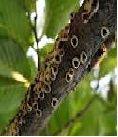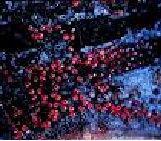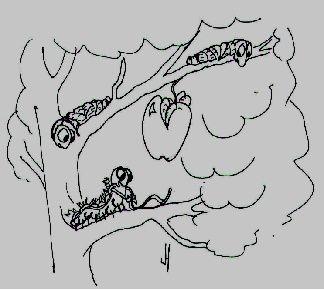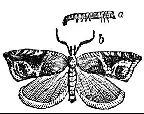Natural Solutions to Things That Bug You (40 page)
Read Natural Solutions to Things That Bug You Online
Authors: Myles Bader

THE PROBLEM CAUSED BY
Reddish-brown round scales on leaves and
twigs, leaves may yellow and drop California red scale
Fruit and leaves have honeydew and black
sooty mold Soft scales
Leaves curled and may have honeydew and mold Aphids
Honeydew on fruit and leaves, flies fly away
when disturbed Whiteflies
Honeydew on fruit and leaves, cottony secretion
on leaves and twigs Cottony cushion scale
Fruit and leaves with honeydew and black mold Mealybugs
Ring or partial ring of scarred tissue on stem
and fruit skin, young leaves may be deformed Citrus thrips
Fruit scarred but no ring around stem Wind abrasion
Holes in blossoms, leaves or new fruit Citrus cutworm
New leaves with holes, webbed together Leaffrollers
Leaves and green fruit have yellow stippling Citrus red mite

ELM TREES
MISCELANEOUS PESTS
EUROPEAN ELM SCALE
General Information:
These pests can easily be spotted on the bark of the trees during the early summer, which is when the scales reach their maturity.

The scales are oval, reddish-purple and have a white, waxy secretion. If you crush them with your fingers they will cause a red stain. They cause the leaves of the tree to become prematurely yellow, especially on the lower branches. If you have a bad infestation the leaves will turn a gray-green and wilt.
WHOOOOSH
One of the easiest ways to eliminate the scales is to use a forceful stream of water using a garden hose. If that doesn’t work use a spray of dormant oil in the early spring.
EUROPEAN RED MITE
General Information:
 This mite attacks fruit trees. The adult is very small and the female is dark red with a few white spots. The most serious infestation usually occurs in the hottest part of the summer around July and August. They feed on chlorophyll and cause the foliage to become bronzed and the fruit may then drop prematurely as well as being small and low in sugar content. If the infestation is early in the season, the bud set for the following year may be reduced.
This mite attacks fruit trees. The adult is very small and the female is dark red with a few white spots. The most serious infestation usually occurs in the hottest part of the summer around July and August. They feed on chlorophyll and cause the foliage to become bronzed and the fruit may then drop prematurely as well as being small and low in sugar content. If the infestation is early in the season, the bud set for the following year may be reduced.
EGG KILL
ER
Apply a superior dormant-oil spray in early spring to kill the over-wintering eggs. This is one of the best methods of eliminating the problem. Most of the time natural predators will take care of the problem since the mites are at the bottom of the food chain.

FRUIT TREE LEAFROLLER
General Information:
The leafroller prefers citrus trees, apple trees and most stonefruit trees. The caterpillar likes to feed on the young leaves, buds and developing fruit. The majority of damage occurs in the spring and early summer months.
About mid-summer the pest will be inactive in the egg stage until the spring when it goes back into action. The caterpillar is green and has a shiny black head and it will feed inside of rolled up leaves or blossoms. When it is disturbed it will fall on a spun thread.

OIL THEM IN THE WINTER
One of the best methods of controlling these pests is to spray oil in January or February before any of the buds begin to open to kill the egg masses on the twigs.
ORIENTAL FRUIT MOTH
General Information:
 The larval stage tunnels into tender peach shoots and other fruit very early in the season and later enters the fruit. If you get a wormy peach it is usually this pest that is at fault. The mature larvae are pinkish and about ½ inches long. The first indication of a problem is the wilting of the terminal of growing shoots. It is not easy to identify the problem with the worms eating the peach around the pit. You may sometimes notice a gummy residue on the outside of the peach. If they
The larval stage tunnels into tender peach shoots and other fruit very early in the season and later enters the fruit. If you get a wormy peach it is usually this pest that is at fault. The mature larvae are pinkish and about ½ inches long. The first indication of a problem is the wilting of the terminal of growing shoots. It is not easy to identify the problem with the worms eating the peach around the pit. You may sometimes notice a gummy residue on the outside of the peach. If they enter through a tiny hole in the stem you may never notice them until it’s too late. Dormant oil sprays do not work on these pests
enter through a tiny hole in the stem you may never notice them until it’s too late. Dormant oil sprays do not work on these pests
PARASITE SAVES THE DAY
There is one parasite that is very useful and will save the crop. The wasp
Macrocentrus ancylivorus
has been used very effectively when this pest is identified.
STOP THE MATING
A relatively new pheromone product called Isomate-M™ will disrupt their mating and reproduction process. It is being used successfully in commercial orchards only.
PEACH TREE
PEACH & NECTARINE PEST PROBLEM SOLVER


